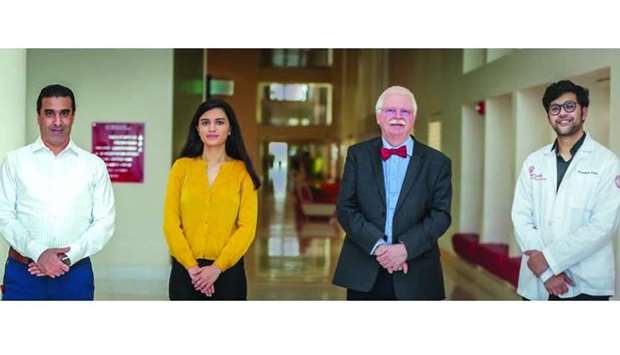Student researchers at Weill Cornell Medicine-Qatar (WCM-Q) contributed to a study investigating the potential of flavonoids found in plants for fighting viral infections such as Sars-CoV-2, the virus that causes Covid-19.
Under the guidance of WCM-Q mentors, medical students Ridhima Kaul and Pradipta Paul conducted a systematic review of 27 existing research papers to determine the effectiveness of 69 different flavonoids against various Sars-CoV-2 drug targets, including ‘3C-like protease’, an enzyme with a key role in replication of the virus.
The study, published in the International Journal of Molecular Sciences, found that several flavonoids showed promising antiviral properties, including quercetin (found in onions, apples, berries and green tea), myricetin (found in tomatoes, oranges, nuts, various herbs, berries, and tea), and tannic acid (found in black garlic extract).
The students were mentored by Dr Ali Chaari, assistant professor of biology, and Dr Dietrich Büsselberg, professor of physiology and biophysics, and assistant dean for admissions.
Dr Chaari said: “Mentoring curious students is important to create opportunities for them to discover the research domain. I was happy to mentor two of our outstanding students, Ridhima Kaul and Pradipta Paul, and to celebrate their success, not only in science but also as future model doctors undertaking research and exemplifying the key attributes of hard work, professionalism, and excellent critical thinking and time management skills.”
Although multiple vaccines have been developed and administered around the globe, newer mutated strains of the virus and the lack of lasting, universal immunity initiated a shift in focus to therapeutic treatments for the disease, which prompted the research paper. Flavonoids are natural phytochemicals. They presented themselves as promising medications given their success during in silico, in vitro, and in vivo studies against Sars-CoV-2 and other viruses.
Second-year medical student, Kaul said: “With more than 5mn lives lost to Covid-19 despite emergency vaccines, the need for therapeutic interventions has been very evident. Amidst this crisis, flavonoids, a large group of compounds with proven therapeutic efficacy against multiple viruses of concern, have shown promise in this regard and are consequently the focus of our analytic work.”
“Our review is unique in providing an analysis of the structure-activity relationships of flavonoids and reviewing ongoing and completed clinical trials - we have widened the scope of our paper to attract both pharmaceutical researchers as well as healthcare providers. This paper is part of a wider project with Dr Ali Chaari where we study the effects of flavonoids, nutraceuticals, and other small molecules on infectious and metabolic diseases,” added Paul.
Other researchers who contributed to the study were Vivek Dhar Dwivedi of the Pathfinder Research and Training Foundation (PRTF) in Uttar Pradesh, India, and Sanjay Kumar of PRTF and the School of Biotechnology at Jawaharlal Nehru University, New Delhi.
Under the guidance of WCM-Q mentors, medical students Ridhima Kaul and Pradipta Paul conducted a systematic review of 27 existing research papers to determine the effectiveness of 69 different flavonoids against various Sars-CoV-2 drug targets, including ‘3C-like protease’, an enzyme with a key role in replication of the virus.
The study, published in the International Journal of Molecular Sciences, found that several flavonoids showed promising antiviral properties, including quercetin (found in onions, apples, berries and green tea), myricetin (found in tomatoes, oranges, nuts, various herbs, berries, and tea), and tannic acid (found in black garlic extract).
The students were mentored by Dr Ali Chaari, assistant professor of biology, and Dr Dietrich Büsselberg, professor of physiology and biophysics, and assistant dean for admissions.
Dr Chaari said: “Mentoring curious students is important to create opportunities for them to discover the research domain. I was happy to mentor two of our outstanding students, Ridhima Kaul and Pradipta Paul, and to celebrate their success, not only in science but also as future model doctors undertaking research and exemplifying the key attributes of hard work, professionalism, and excellent critical thinking and time management skills.”
Although multiple vaccines have been developed and administered around the globe, newer mutated strains of the virus and the lack of lasting, universal immunity initiated a shift in focus to therapeutic treatments for the disease, which prompted the research paper. Flavonoids are natural phytochemicals. They presented themselves as promising medications given their success during in silico, in vitro, and in vivo studies against Sars-CoV-2 and other viruses.
Second-year medical student, Kaul said: “With more than 5mn lives lost to Covid-19 despite emergency vaccines, the need for therapeutic interventions has been very evident. Amidst this crisis, flavonoids, a large group of compounds with proven therapeutic efficacy against multiple viruses of concern, have shown promise in this regard and are consequently the focus of our analytic work.”
“Our review is unique in providing an analysis of the structure-activity relationships of flavonoids and reviewing ongoing and completed clinical trials - we have widened the scope of our paper to attract both pharmaceutical researchers as well as healthcare providers. This paper is part of a wider project with Dr Ali Chaari where we study the effects of flavonoids, nutraceuticals, and other small molecules on infectious and metabolic diseases,” added Paul.
Other researchers who contributed to the study were Vivek Dhar Dwivedi of the Pathfinder Research and Training Foundation (PRTF) in Uttar Pradesh, India, and Sanjay Kumar of PRTF and the School of Biotechnology at Jawaharlal Nehru University, New Delhi.

